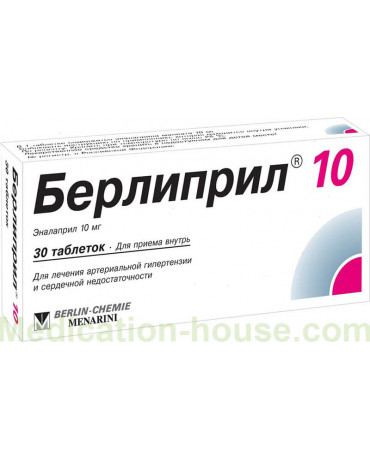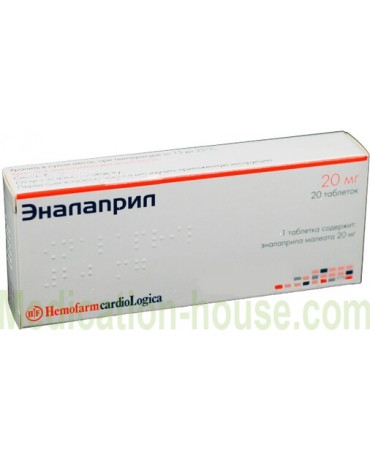Instruction for Renipril
You can buy Renipril on this page
Renipril is an angiotensin converting enzyme (ACE) inhibitor, antihypertensive drug.
Release form and composition
Dosage form - tablets: flat-cylindrical, white, beveled and scored (10 or 20 pcs. In blisters, in a cardboard box 1, 2 or 3 packages and instructions for the use of Renipril).
Active ingredient: enalapril maleate - 10 or 20 mg in 1 tablet.
Excipients: low molecular weight povidone, potato starch, calcium stearate, lactose.
Pharmacodynamics
The active ingredient in Renipril, enalapril, is an angiotensin-converting enzyme (ACE) inhibitor that exhibits an antihypertensive effect. Its mechanism is due to the ability to inhibit the activity of ACE, which reduces the formation of angiotensin II, which constricts the blood vessels, and at the same time to activate the formation of prostacyclin and kinins, which have a vasodilating effect.
Enalapril is a prodrug. As a result of hydrolysis in the body, enalaprilat is formed, which inhibits ACE.
Enalapril also has some diuretic properties, which is associated with a moderate inhibition of aldosterone synthesis.
Along with lowering blood pressure, Renipril improves respiratory function and blood circulation in the small circle, reduces pre- and afterload on the myocardium in patients with heart failure, reduces resistance in the vessels of the kidneys and, as a result, normalizes blood circulation in them.
Pharmacokinetics
After oral administration of Renipril, enalapril is absorbed by 60%. Simultaneous food intake does not affect the degree of absorption.
It is metabolized in the liver to form the active metabolite of enalaprilat. Enalaprilat binds to plasma proteins by 50-60%.
The maximum concentration of enalapril is observed 1 hour after taking the drug, enalaprilat - after 3-4 hours.
Enalaprilat poorly penetrates the blood-brain barrier, in small quantities it penetrates the placental barrier and into breast milk.
The drug is excreted: by the kidneys (up to 60%) - 20% of enalapril and 40% of enalaprilat; through the intestines (33%) - 6% enalapril and 27% enalaprilat.
Indications for use
Arterial hypertension;
Chronic heart failure (as part of combination therapy).
Contraindications
Absolute:
Porphyria;
Idiopathic or hereditary edema;
A history of angioedema associated with the use of ACE inhibitors;
Age under 18;
Pregnancy and lactation period;
Hypersensitivity to any component of Renipril or other ACE inhibitors.
Carefully:
Primary hyperaldosteronism;
Hyperkalemia;
Condition after kidney transplant;
Bilateral stenosis of the renal arteries or stenosis of an artery of a single kidney;
Mitral (with hemodynamic disturbances) or aortic stenosis;
Idiopathic hypertrophic subaortic stenosis;
Coronary artery disease;
Systemic connective tissue diseases;
Diabetes;
Oppression of bone marrow hematopoiesis;
Liver failure;
Renal failure (proteinuria - more than 1 g / day);
Cerebrovascular diseases;
Conditions accompanied by a decrease in the volume of circulating blood (including diarrhea and / or vomiting, hemodialysis, diuretic therapy, adherence to a diet with limited salt intake);
Advanced age (over 65);
Simultaneous use of immunosuppressants or saluretics.
Renipril, instructions for use: method and dosage
Renipril tablets should be taken orally. Eating does not affect efficiency.
It can be used both as monotherapy and in combination with other antihypertensive drugs.
Arterial hypertension
As a monopreparation, Renipril is prescribed 5 mg once a day.
Within 2 hours after taking the first dose or until blood pressure (BP) stabilizes, the patient should be under medical supervision.
If there is no clinical effect within 1-2 weeks, the dose is increased to 10 mg. If necessary, but provided that the drug is well tolerated, it is possible to increase the daily dose to 40 mg in 2 divided doses.
After 2-3 weeks, they switch to maintenance therapy at a dose of 10-40 mg per day in 1-2 doses. With moderate arterial hypertension, 10 mg per day is usually sufficient.
The highest permissible daily dose is 40 mg.
If Renipril is prescribed to patients who are already receiving diuretics, they should be discontinued 2-3 days before. If this is not possible, then the initial dose of enalapril should be 2.5 mg per day.
The recommended initial dose for patients with a serum creatinine concentration of more than 0.14 mmol / L or hyponatremia (a serum sodium ion concentration of less than 130 mmol / L) is 2.5 mg once a day.
With renovascular hypertension, at the beginning of treatment, 2.5-5 mg per day are prescribed. The highest daily dose of Renipril is 20 mg.
Chronic heart failure
The recommended initial dose is 2.5 mg once a day, then every 3-4 days (depending on the effect of the drug) the dose is gradually increased (by 2.5-5 mg) until the maximum tolerated and effective dose is reached, taking into account the value of blood pressure, but not more than 40 mg per day in 1-2 doses.
With an initially low systolic blood pressure (less than 110 mm Hg), treatment begins with a daily dose of 1.25 mg, after which, within 2-4 weeks (sometimes in a shorter period), the doctor selects the dose. The average maintenance dose ranges from 5 to 20 mg per day in 1-2 doses.
The starting dose for the elderly is 1.25 mg.
Recommended daily doses for patients with chronic renal failure, depending on creatinine clearance (CC): CC 80-30 ml / min - 5-10 mg, CC up to 30-10 ml / min - 2.5-5 mg, CC less than 10 ml / min - 1.25-2.5 mg only on dialysis days.
The duration of therapy depends on the effectiveness of the drug.
In the case of a too pronounced decrease in blood pressure, the dose of Renipril is gradually reduced.
Side effects
Basically, Renipril is well tolerated. In some cases, the following side effects occur:
From the respiratory system: pharyngitis, unproductive dry cough, rhinorrhea, bronchospasm, interstitial pneumonitis, shortness of breath;
From the nervous system: increased fatigue, anxiety, insomnia, confusion, weakness, drowsiness, headache, dizziness; very rarely when taking high doses - depression, nervousness, paresthesia;
From the urinary system: proteinuria, impaired renal function;
From the senses: tinnitus, hearing and vision impairments, vestibular disorders;
On the part of the cardiovascular system: excessive decrease in blood pressure, orthostatic collapse; rarely - angina pectoris, chest pain, myocardial infarction; extremely rare - thromboembolism of the branches of the pulmonary artery, heart palpitations, arrhythmias (atrial fibrillation, atrial bradycardia or tachycardia);
From the digestive tract: dyspeptic disorders (diarrhea / constipation, nausea, vomiting, abdominal pain), anorexia, dry mouth, jaundice, intestinal obstruction, impaired liver function and bile secretion, pancreatitis, hepatitis;
On the part of laboratory parameters: hyperkalemia, hyperbilirubinemia, hyponatremia, increased urea content, hypercreatininemia, increased activity of liver enzymes; in rare cases - eosinophilia, neutropenia, thrombocytopenia, increased ESR, decreased hematocrit; in patients with autoimmune diseases - agranulocytosis;
Allergic reactions: urticaria, itching, skin rash, angioedema; extremely rare - pemphigus, serositis, stomatitis, photosensitization, glossitis, myositis, vasculitis, arthritis, arthralgia, polymorphic erythema, dysphonia, exfoliative dermatitis, toxic epidermal necrolysis, Steven-Johnson syndrome;
Others: hot flashes, decreased libido, alopecia.
Overdose
In case of an overdose, arterial hypotension develops.
The patient must be laid down and his legs raised. In mild cases, oral saline is sufficient. In severe cases, hospitalization is carried out with a complex of therapeutic measures aimed at stabilizing blood pressure: intravenous administration of 0.9% sodium chloride solution or plasma substitutes. If necessary, hemodialysis is prescribed.
Special instructions
Transient arterial hypotension is not a contraindication for continuing therapy with the drug after stabilization of blood pressure. However, in the case of a repeated pronounced decrease in blood pressure, it is necessary to reduce the dose or cancel the drug.
With the use of highly permeable dialysis membranes, the risk of developing an anaphylactic reaction increases. Dose adjustments on dialysis-free days should be made based on blood pressure.
Careful observation is required in patients with coronary artery disease, cerebrovascular disease and severe heart failure. in them, a sharp decrease in blood pressure can lead to impaired renal function, stroke or myocardial infarction.
Before prescribing the drug and during its use, it is necessary to periodically monitor blood pressure, the level of protein in the blood, as well as the concentration of urea, potassium, hemoglobin, creatinine, and the activity of liver enzymes.
With severe autoimmune diseases (for example, scleroderma or systemic lupus erythematosus) while taking the drug, the risk of developing neutropenia or agranulocytosis increases.
Abrupt cessation of therapy does not lead to withdrawal syndrome (a sharp increase in blood pressure).
Alcohol enhances the hypotensive effect of the drug, so you should stop drinking alcohol.
With renal failure, the excretion of the active metabolite of enalapril may decrease, which is fraught with an increase in its concentration in the blood plasma. Such patients may need to reduce the dose of Renipril.
Newborns and infants whose mothers took the drug during pregnancy should be under close medical supervision for the timely detection of neurological disorders, hyperkalemia, oliguria, a pronounced decrease in blood pressure - disorders that are possible due to a decrease in cerebral and renal blood flow with a decrease in blood pressure caused by an ACE inhibitor.
With oliguria, it is necessary to maintain blood pressure and renal perfusion, for this, appropriate fluids and vasoconstrictors are administered.
Renipril should be discontinued if it is necessary to study the functions of the parathyroid glands.
A dose reduction may be required in patients with renal artery (renal artery) stenosis because they have an increased risk of increased serum creatinine and urea levels, therefore, kidney function should be monitored during the first few weeks of treatment.
Patients should warn the doctor and / or anesthesiologist about taking the drug if surgery, including dental, is necessary.
With caution the drug should be taken in chronic heart failure in case of simultaneous use of diuretics and / or cardiac glycosides.
Influence on the ability to drive vehicles and complex mechanisms
Due to the likelihood of dizziness, especially after the first dose in patients receiving diuretics, at the beginning of treatment and during the dose titration period, it is necessary to refrain from driving and performing potentially hazardous work that requires a speed of reactions and / or increased attention.
Application during pregnancy and lactation
Renipril is contraindicated during pregnancy. If therapy is necessary during lactation, breastfeeding should be discontinued.
Childhood use
Renipril is not used in children and adolescents.
With impaired renal function
For patients with impaired renal function, reduce the single dose or increase the intervals between doses.
For violations of liver function
Patients with impaired hepatic function should use the tablets with caution.
Use in the elderly
Caution is required when using Renipril in old age (> 65 years).
Drug interactions
Non-steroidal anti-inflammatory drugs, estrogens: the hypotensive effect decreases;
Potassium-sparing diuretics (triamterene, spironolactone, amiloride): the risk of hyperkalemia increases;
Lithium salts: lithium excretion slows down (it is necessary to control the concentration of lithium in the blood plasma);
Drugs that cause bone marrow suppression: the risk of developing neutropenia and / or agranulocytosis increases;
Antipyretic and pain relievers: the effectiveness of enalapril decreases;
Theophylline: its effect decreases;
Ethanol, beta-blockers, slow calcium channel blockers, general anesthetics, nitrates, diuretics, prazosin, hydralazine, methyldopa: the hypotensive effect of enalapril is enhanced;
Immunosuppressants, cytostatics, allopurinol: hematotoxicity increases.
Terms and conditions of storage
Store at temperatures up to 25 ° C out of reach of children.
Shelf life is 4 years.
Reviews
Reviews about Renipril are mostly positive. Patients emphasize the high efficiency of the drug, its good tolerance and affordable cost. Of the side effects, dizziness and the appearance of a dry cough are most often noted.
Terms of sell
You don't need a doctor's prescription to buy Renipril.



